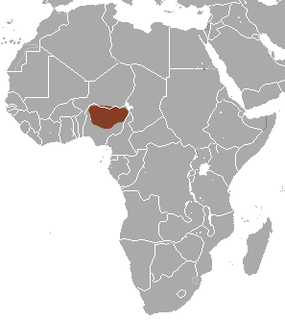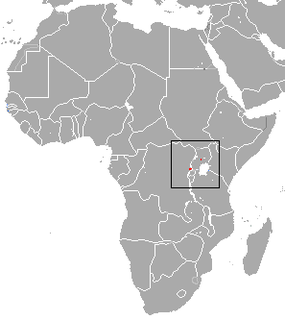
The Hun shrew is a species of mammal in the family Soricidae. It is found in Cameroon, Central African Republic, Mali, Democratic Republic of the Congo, and Nigeria. Its natural habitats are tropical or subtropical moist lowland or montane forest, and heavily degraded former forest.

Bates's shrew is a species of mammal in the family Soricidae. It is found in Cameroon, Republic of the Congo, Equatorial Guinea, and Gabon. Its natural habitat is subtropical or tropical moist lowland forests. This large black shrew was first described by the British zoologist Guy Dollman in 1915, the type locality being the vicinity of the Como River in Gabon. The exact definition of this species is unclear; it is often included in Fraser's musk shrew, or reported as Wimmer's shrew. Its karyotype is 2n=50, FN-76, which is identical to the Nigerian shrew, and the species complex is in need of a thorough revision.

The African dusky shrew or African foggy shrew is a species of shrew. It is native to the Democratic Republic of the Congo, where it lives in forests.

The long-footed shrew is a species of mammal in the family Soricidae. It is found in Cameroon, Central African Republic, Republic of the Congo, Democratic Republic of the Congo, Equatorial Guinea, and Gabon. Its natural habitat is subtropical or tropical moist lowland forests.

Dent's shrew is a species of mammal in the family Soricidae. It is found in Cameroon, Central African Republic, Republic of the Congo, Democratic Republic of the Congo, Equatorial Guinea, Gabon, Guinea, Liberia, Nigeria, Sierra Leone, and Uganda. Its natural habitats are subtropical or tropical moist lowland forest and moist savanna.

The long-tailed musk shrew is a species of mammal in the family Soricidae. It is found in Burundi, Cameroon, Central African Republic, Republic of the Congo, Democratic Republic of the Congo, Gabon, Nigeria, and Uganda.

The goliath shrew is a species of mammal in the family Soricidae. It is found in Cameroon, Central African Republic, Republic of the Congo, Democratic Republic of the Congo, Equatorial Guinea, and Gabon. Its natural habitat is subtropical or tropical moist lowland forests.

The Grasse's shrew is a species of mammal in the family Soricidae. It is found in Cameroon, Central African Republic, Republic of the Congo, Gabon, and Equatorial Guinea. Its natural habitat is subtropical or tropical moist lowland forests.

Hildegarde's shrew is a species of mammal in the family Soricidae. It is found in Burundi, Cameroon, Central African Republic, Republic of the Congo, Democratic Republic of the Congo, Ethiopia, Kenya, Rwanda, and Tanzania. Considered by some authorities to be a subspecies of Crocidura gracilipes, it is now recognised as a separate species, with a diploid chromosome number of 2n = 52. This is one of three species of small mammal named by the British zoologist Oldfield Thomas in honour of anthropologist Hildegarde Beatrice Hinde.

The Kivu shrew is a species of mammal in the family Soricidae. It is endemic to Democratic Republic of the Congo. Its natural habitat is swamp.

The Kivu long-haired shrew is a species of mammal in the family Soricidae. It is found in the Democratic Republic of the Congo and Rwanda. Its natural habitats are subtropical or tropical moist montane forests and swamps.

Latona's shrew is a species of mammal in the family Soricidae. It is endemic to Democratic Republic of the Congo. Its natural habitat is subtropical or tropical moist lowland forests.

The Butiaba naked-tailed shrew is a species of mammal in the family Soricidae. It is found in Cameroon, Central African Republic, Republic of the Congo, Democratic Republic of the Congo, Kenya, and Uganda. Its natural habitat is subtropical or tropical moist lowland forests.

Ludia's shrew is a species of mammal in the family Soricidae. It is found in Cameroon, Central African Republic, Republic of the Congo, and Democratic Republic of the Congo. Its natural habitat is subtropical or tropical moist lowland forests.

The swamp musk shrew, or musk shrew, is a species of mammal in the family Soricidae. It occurs in Angola, Botswana, Democratic Republic of the Congo, Mozambique, Namibia, South Africa, Eswatini, Zambia and Zimbabwe. Its natural habitat is swamps, and it is a common species in suitable habitats, with the International Union for Conservation of Nature listing it as being of "least concern".

The flat-headed shrew is a species of mammal in the family Soricidae. It is found in the Democratic Republic of the Congo, Ethiopia, Nigeria, and Uganda. The flat-headed shrew is listed as Data Deficient on the IUCN Red List of Threatened Species.

Fraser's musk shrew is a species of mammal in the family Soricidae. It is found in Benin, Cameroon, Ivory Coast, Equatorial Guinea, Ghana, Guinea, Liberia, Nigeria, São Tomé and Príncipe, Sierra Leone, and Togo. Its natural habitat is subtropical or tropical moist lowland forests. This large black shrew was first described by the British zoologist Louis Fraser in 1843. Its exact definition is unclear; the karyotype comes from Ivory Coast but not from Equatorial Guinea, which is given as the type locality.

The tarella shrew is a species of mammal in the family Soricidae. It is found in Democratic Republic of the Congo and Uganda. Its natural habitats are subtropical or tropical moist lowland forest and montane forest.

The turbo shrew is a species of mammal in the family Soricidae. It is found in Angola, Burundi, Cameroon, Central African Republic, Republic of the Congo, Democratic Republic of the Congo, Equatorial Guinea, Gabon, Kenya, Malawi, Rwanda, South Sudan, Tanzania, Uganda, and Zambia. Its natural habitats are subtropical or tropical moist lowland and montane forests.

The Upemba shrew is a species of shrew in the family Soricidae. It is endemic to Democratic Republic of the Congo. Its natural habitat is swamp.





















